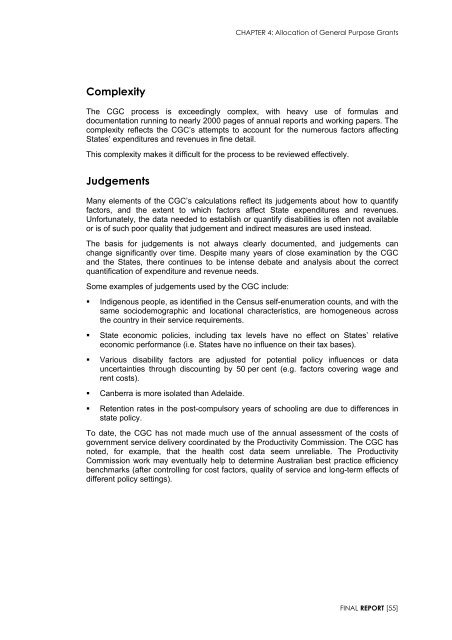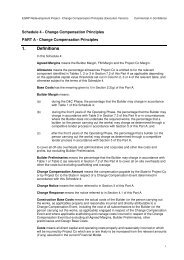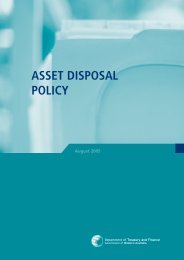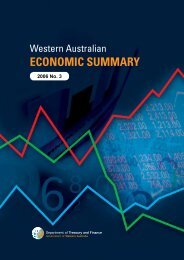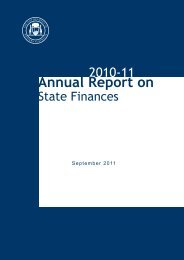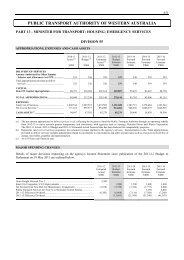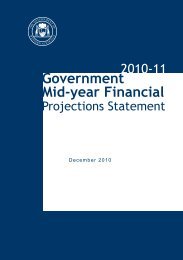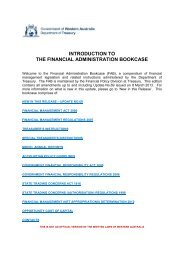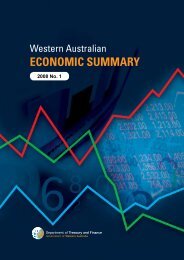Garnaut Fitzgerald Review of Commonwealth-State Funding
Garnaut Fitzgerald Review of Commonwealth-State Funding
Garnaut Fitzgerald Review of Commonwealth-State Funding
You also want an ePaper? Increase the reach of your titles
YUMPU automatically turns print PDFs into web optimized ePapers that Google loves.
CHAPTER 4: Allocation <strong>of</strong> General Purpose Grants<br />
Complexity<br />
The CGC process is exceedingly complex, with heavy use <strong>of</strong> formulas and<br />
documentation running to nearly 2000 pages <strong>of</strong> annual reports and working papers. The<br />
complexity reflects the CGC’s attempts to account for the numerous factors affecting<br />
<strong>State</strong>s’ expenditures and revenues in fine detail.<br />
This complexity makes it difficult for the process to be reviewed effectively.<br />
Judgements<br />
Many elements <strong>of</strong> the CGC’s calculations reflect its judgements about how to quantify<br />
factors, and the extent to which factors affect <strong>State</strong> expenditures and revenues.<br />
Unfortunately, the data needed to establish or quantify disabilities is <strong>of</strong>ten not available<br />
or is <strong>of</strong> such poor quality that judgement and indirect measures are used instead.<br />
The basis for judgements is not always clearly documented, and judgements can<br />
change significantly over time. Despite many years <strong>of</strong> close examination by the CGC<br />
and the <strong>State</strong>s, there continues to be intense debate and analysis about the correct<br />
quantification <strong>of</strong> expenditure and revenue needs.<br />
Some examples <strong>of</strong> judgements used by the CGC include:<br />
• Indigenous people, as identified in the Census self-enumeration counts, and with the<br />
same sociodemographic and locational characteristics, are homogeneous across<br />
the country in their service requirements.<br />
• <strong>State</strong> economic policies, including tax levels have no effect on <strong>State</strong>s’ relative<br />
economic performance (i.e. <strong>State</strong>s have no influence on their tax bases).<br />
• Various disability factors are adjusted for potential policy influences or data<br />
uncertainties through discounting by 50 per cent (e.g. factors covering wage and<br />
rent costs).<br />
• Canberra is more isolated than Adelaide.<br />
• Retention rates in the post-compulsory years <strong>of</strong> schooling are due to differences in<br />
state policy.<br />
To date, the CGC has not made much use <strong>of</strong> the annual assessment <strong>of</strong> the costs <strong>of</strong><br />
government service delivery coordinated by the Productivity Commission. The CGC has<br />
noted, for example, that the health cost data seem unreliable. The Productivity<br />
Commission work may eventually help to determine Australian best practice efficiency<br />
benchmarks (after controlling for cost factors, quality <strong>of</strong> service and long-term effects <strong>of</strong><br />
different policy settings).<br />
FINAL REPORT [55]


